TORONTO (Mar. 15) — Here in Canada, the peripheral effect of the COVID–19 pandemic will weigh enormously on the 24–hour sports–television networks: TSN and Sportsnet. With live programming essential, Sportsnet, in particular, becomes vulnerable to the shut–down of all professional games in North America. The sweeping moratorium has occurred just prior to the stretch–run of the National Hockey League season; the Stanley Cup playoffs, and the start of the Major League Baseball schedule. Sportsnet is almost–solely dependent on the NHL and the Toronto Blue Jays — the latter, owned by parent company, Rogers Communications, and accountable for 162 days and nights of live telecasting between early–April and late–September. How could any media platform compensate for such a dearth of vital programming?
The internal hope, of course, is that the coronavirus surge will abate sufficiently to embolden the return of hockey and baseball before the loss of advertising revenue becomes a crisis. If this were to happen before, say, the second week of May, the dilemma will subside. Such a time–frame would allow for the entire Stanley Cup tournament, though it would likely extend, for the first time, into July and perhaps necessitate best–of–five series in the first two rounds. The latest the Cup has been presented is June 24 — after the 48–game, lockout–shortened seasons of January–to–May 1995 and 2013. It would also accommodate nearly a full baseball schedule; perhaps 140 games. If, however, the pandemic lingers for three or four months, as widely predicted, there will not be a Stanley Cup tournament in 2020 and the baseball slate would dwindle by up to 50 percent. In 1981, a players’ strike between June 12 and July 31 engendered a split season. The 26 Major League teams played between 102 and 111 games. The playoffs consisted of two best–of–five Divisional series in each league; the National and American League Championship Series (also best–of–five) and a best–of–seven World Series (the Los Angeles Dodgers over the New York Yankees). Undoubtedly, baseball would go forth with an 80 or 90–game schedule, were the sport shut down, this year, until early–July.
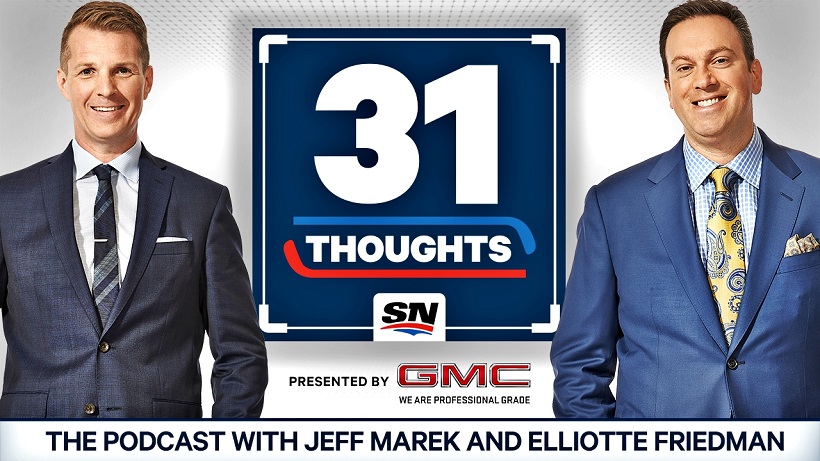
HERE’S HOPING JEFF AND ELLIOTTE DON’T RUN OUT OF “THOUGHTS” DURING THE CORONAVIRUS.
The loss of the entire Stanley Cup playoffs — in the absence of baseball — would be a terrific blow to Sportsnet, though the NHL would surely adjust the annual premium owed by its Canadian broadcast partner. Rogers assumed national rights to the NHL in 2013 with a 12–year, $5.3 billion commitment. It has struggled mightily under that arrangement, leading to the demise of its most–identifiable TV and radio figures; among them, Don Cherry, Bob McCown, Glenn Healy and Nick Kypreos. Viewership will trickle to an unparalleled depth if there is no hockey until next October. And, heaven knows how Sportsnet will sub for three hours of live programming each day until (or if) baseball returns. In its place, we’ll be offered vast amounts of championship poker; European soccer (until it, too, suspends play) and, perhaps, the Ultimate Fighting Championship (UFC), which has unconscionably pressed forward amid the COVID–19 crisis.
You can count upon reruns of classic games in all sports consuming loads of air time.
The suspension of play in hockey and baseball will similarly impact all–sports radio, but not as severely as TV. Rogers operates radio outlets in Toronto (Sportsnet–590), Calgary (Sportsnet–960) and Vancouver (Sportsnet–650). Bell Canada Enterprises, owner of TSN, has a larger cast — all–sports stations in Montreal (TSN–960), Ottawa (TSN–1200), Toronto (TSN–1050), Hamilton (TSN–1150), Winnipeg (TSN–1290), Edmonton (TSN–1260) and Vancouver (TSN–1040). These outlets operate as separate businesses (accruing their own ad revenue), yet are adjuncts to the television networks. Were they independent of Sportsnet and TSN, they wouldn’t likely withstand the loss of nightly, live programming. Radio can also compensate, overwhelmingly, with the intrinsic element of discussion and dialogue — hardly an optical alternative for TV.
Likewise, there is only so much a newspaper columnist can write about the coronavirus and its impact on the sports world. Here in Toronto, Bruce Arthur, Dave Feschuk and Gregor Chisholm of the Star; Steve Simmons and Michael Traikos (the Sun) and Cathal Kelly (the Globe and Mail) will need to draw on their creative instincts. So, too (sigh), will a former radio hockey reporter–turned–Maple Leafs–blogger. 🙁
50 YEARS AGO TODAY
at Maple Leaf Gardens
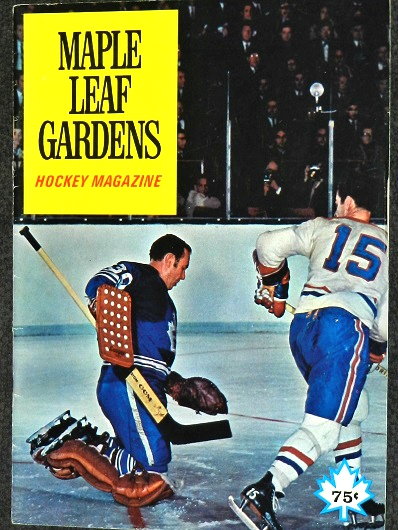
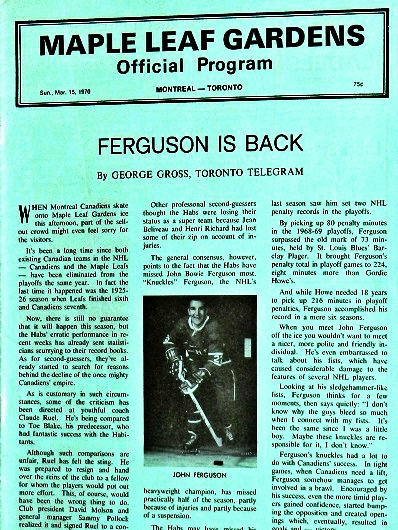
Concluding with my collection of programs, this was the last game I attended at Maple Leaf Gardens during the 1969–70 season — an afternoon match between Toronto and Montreal, one–half–century ago today, televised by CBS in the United States. Under no circumstance, other than the Stanley Cup final, would two Canadian teams be featured in this era on national television south of the border. But, times were different in 1970 with the six pre–expansion clubs (Boston, Chicago, Detroit, New York, Montreal, Toronto) a far–bigger draw than the third–year expansion teams (Los Angeles, Minnesota, Oakland, Philadelphia, Pittsburgh, St. Louis). Having met for the Stanley Cup just three years earlier, the Leafs and Habs were about to miss the playoffs together for the first time. Perhaps fittingly, the clubs played to a 3–3 tie. Paul Henderson scored for the Leafs just 14 seconds after the opening face–off, but Peter Mahovlich, Larry Mickey and Ralph Backstrom put the Canadiens up, 3–1, by the end of the first period. Dave Keon scored his 31st goal late in the middle frame and Ron Ellis notched the tying marker (his 30th) with 6:41 left in the game. Toronto out–shot Montreal in a wide–open affair, 49–42. Rogatien (later “Rogie”) Vachon and Bruce Gamble were the goalies. Bruce Hood officiated the match with linesmen Neil Armstrong and John D’Amico.
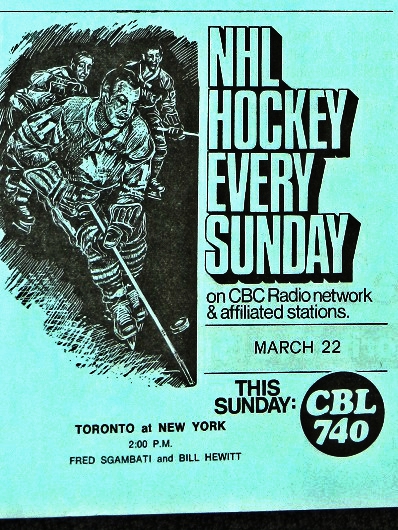
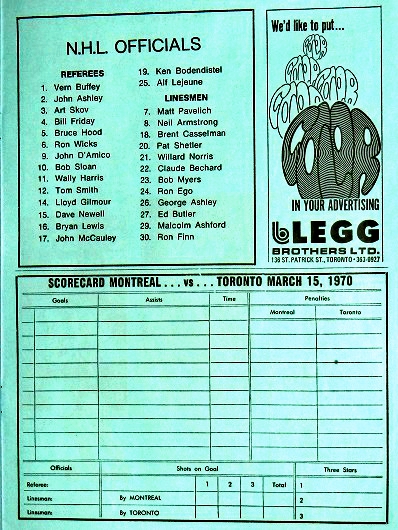
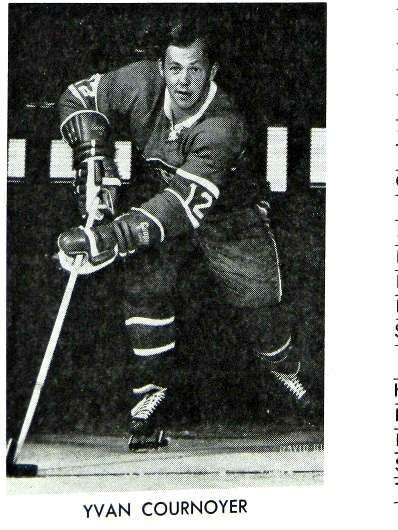
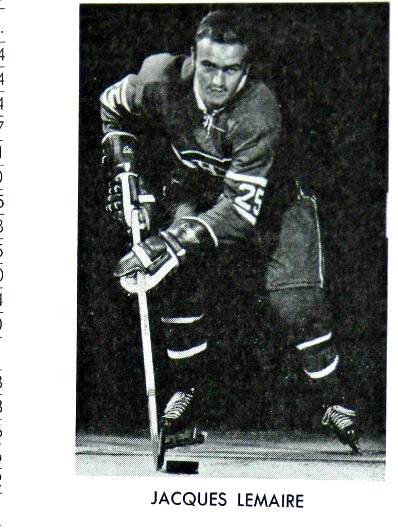
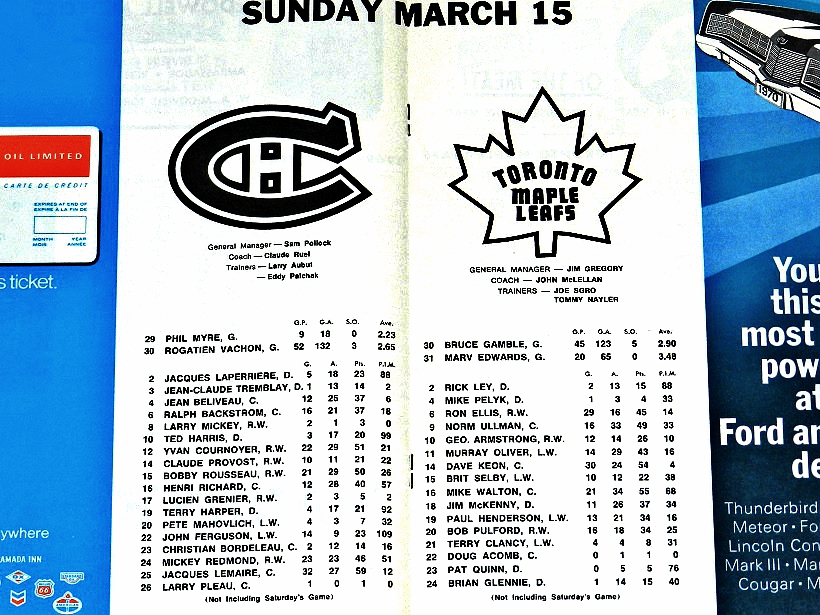
It’s funny the memories we retain. While attending this game with my father, I was so excited about getting home and watching The Wizard of Oz on TV later that night. Unlike today, when movies are available on–line, television was our sole outlet. And, CBS would show The Wizard of Oz once a year, in March. In 1970, the movie had been filmed just 31 years prior (1939). Among the great players in the Leafs–Habs matinee, it was Montreal’s Jacques Lemaire leading the way, with 59 points, four more than Toronto center Mike Walton.
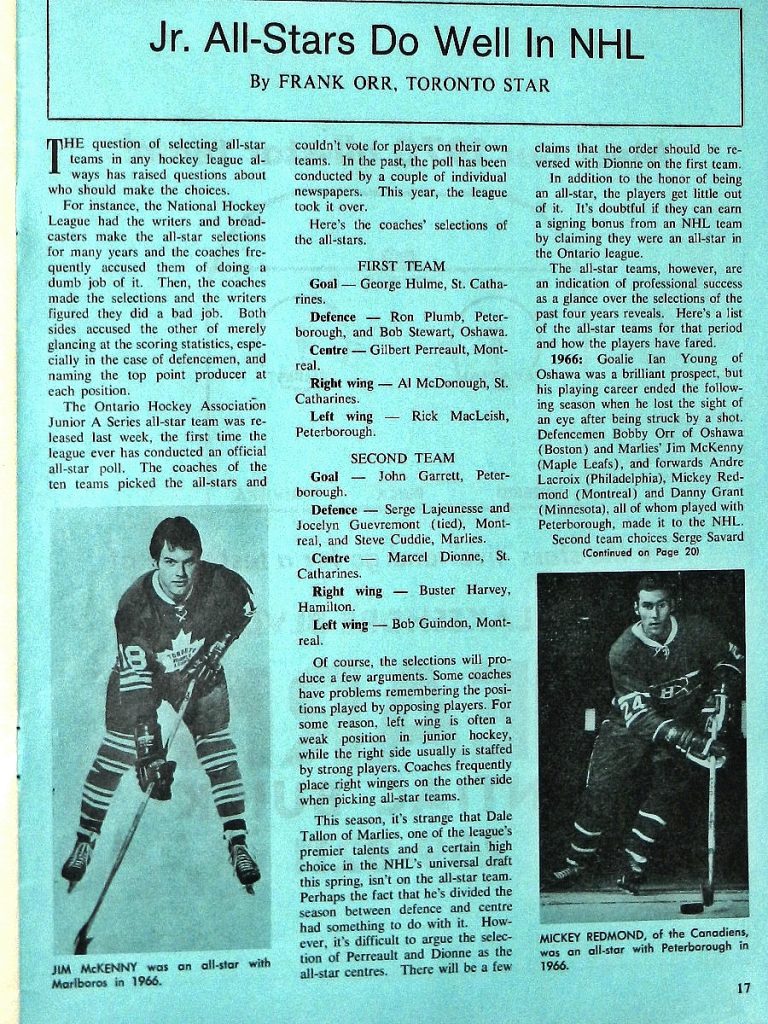
Frank Orr of the Toronto Star penned his Junior hockey report (above and below).
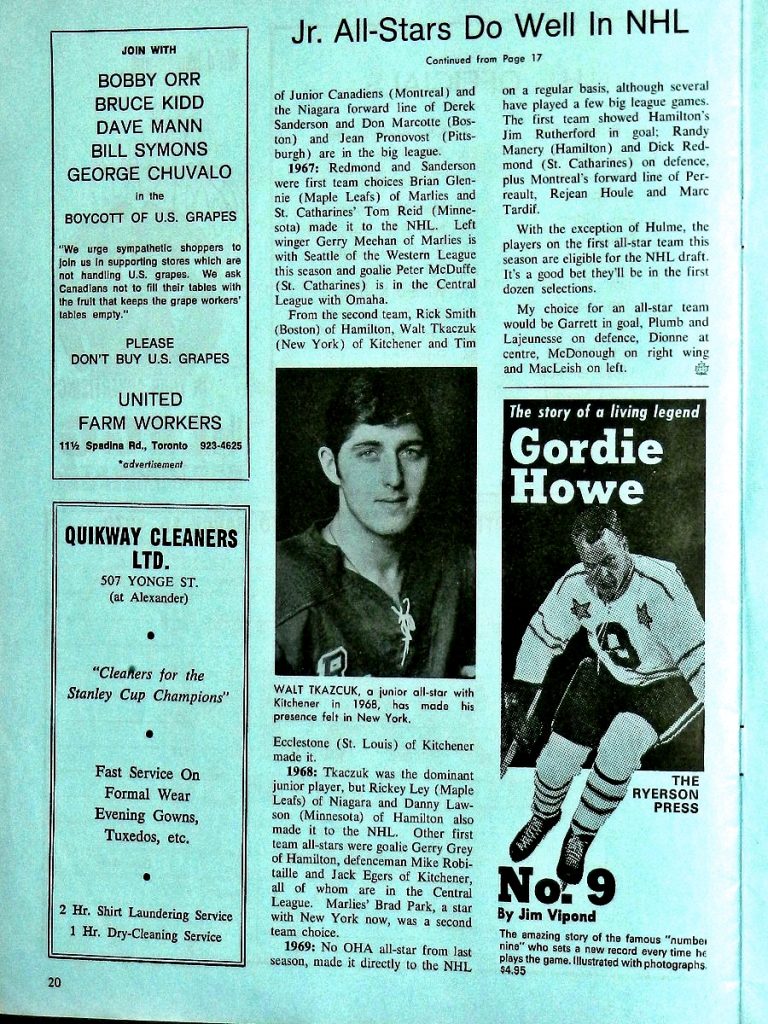
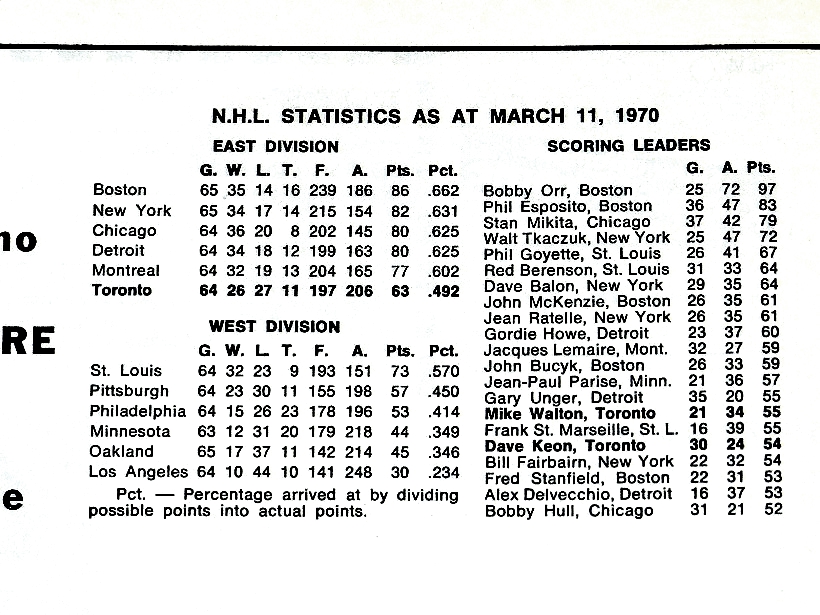
Bobby Orr of Boston would become the first defenseman to win the Art Ross Trophy, finishing 1969–70 with 33 goals and 120 points. He repeated the accomplishment in 1974–75. Orr capped his phenomenal season by scoring the overtime goal on fellow Hall–of–Famer Glenn Hall that won the 1970 Stanley Cup over St. Louis… and spawned the most–iconic image in hockey annals.
EMAIL: HOWARDLBERGER@GMAIL.COM



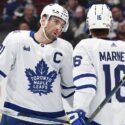


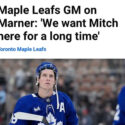



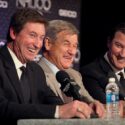
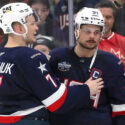

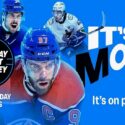
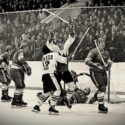



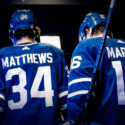



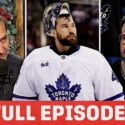



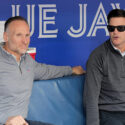
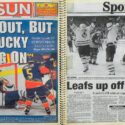

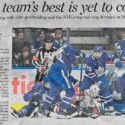


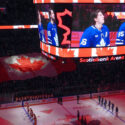


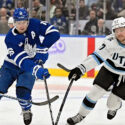
I wonder … Is it safe to safe to say that Rogers is losing less money with NHL Games being cancelled than when they were being played? The chiefs on Bloor st must be begging the NHL to stay on pause for quite a while!
I kid … It’s already impossible for me to watch sports TV and nowadays, I usually just skim the headlines on sportsnet/TSN web pages. I do thoroughly enjoy my favourite hockey blog however :). Gives me a chance to read some unbiased opinion from a still somewhat connected hockey mind and your history predates mine by about 15 years, so I like to enjoy the historical content too.
Excuse me while I weep great crocodile tears for the horrible people in management and who run Sportsnet and Rogers.
How do you know these people are “horrible”? Have you met them?